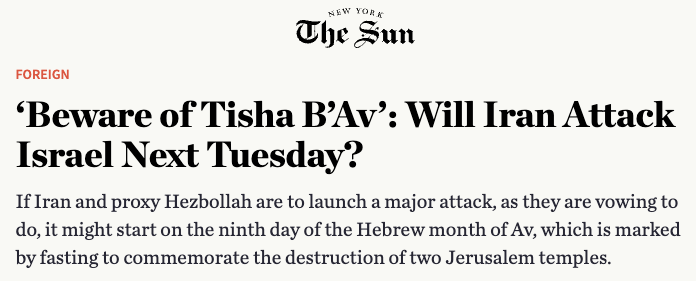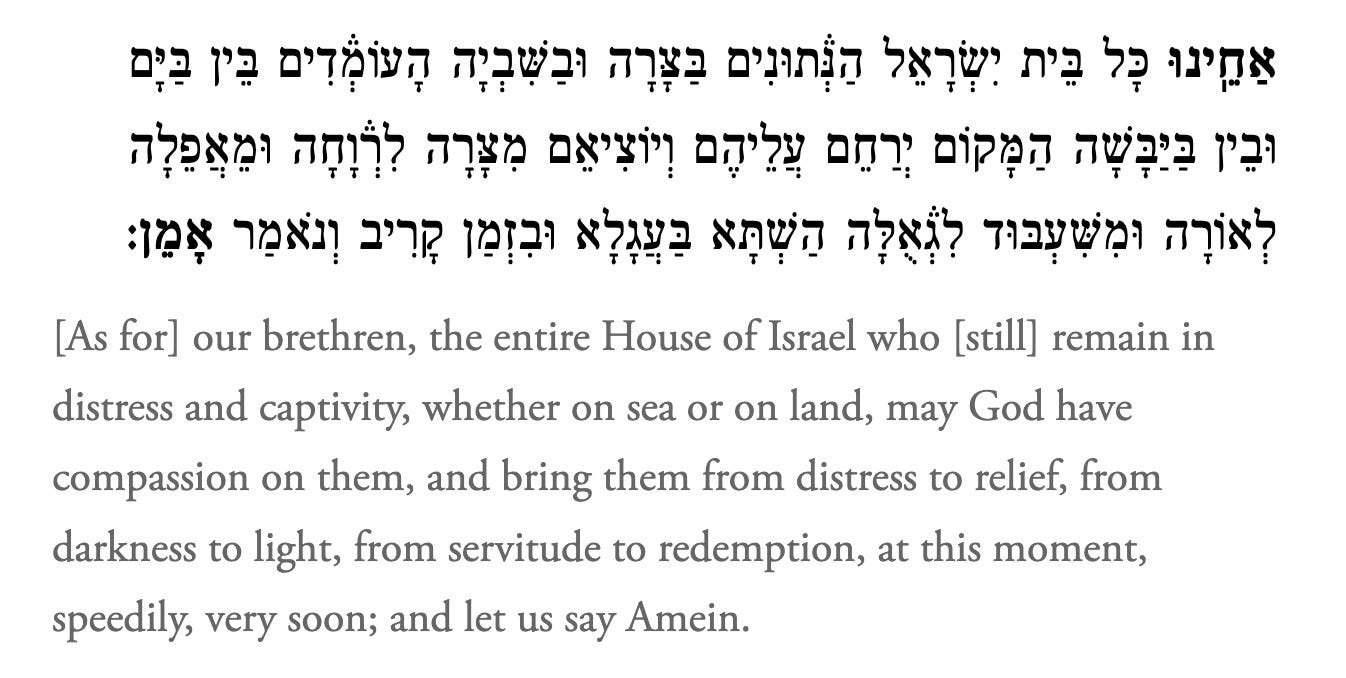There’s a seemingly strange story in the Talmud, which we’ll discuss tomorrow, in which during the siege on Jerusalem, a wealthy woman dies from stepping in dung. For all the years that I’ve read that story, much of which is harrowing, the part about her stepping in dung and dying has struck me as odd, as less profound than the rest of the story. After all, people don’t die from stepping in dung.
This year, though, I think that I finally understand the story. She didn’t die from stepping in dung; she died because her broken heart couldn’t take one more thing going wrong. Tomorrow, we’ll look at that story more carefully, and look back at Tisha B’Av a year ago—where Israel was, what we were worried about, how last year’s worries seem almost trivial compared to this year’s, but how—if we look carefully—the present crisis was already underway, long before we knew.
Today, for the first time, I feel the nervousness in the street. People stocking up on canned goods and water. A neighbor stopping by to go over what they have put in their safe rooms and comparing checklists (“don’t forget a can opener” — no point having all the canned goods if you can’t open them)”, if they can get the steel cover to their safe room window fully slid shut. As of today, the air force has forbidden soldiers from leaving the country.
Today, it’s in the air in a way that it hasn’t been before. Newscasters repeating time and again that no, despite rumors to the contrary, the attack has not started. Not theirs, and not ours.
It’s also Tisha B’Av that’s in the air. The Ninth of Av begins tonight. A day on the Jewish calendar that on most years is observed almost exclusively by the religious community, is this year a day on which much of the country is focused.
Iran, of course, has played a major role in bringing Tisha B’Av to national attention. Even the foreign press has reported Teheran’s threat that the reprisal attack still expected might take place on Tisha B’Av.
This is now a country fairly certain that it is headed to some form of expanded war. That the war might break out right before, during, or right after Tisha B’Av is, obviously chilling. Suddenly, the famous Mishnah about the date of the destruction of the two temples feels ominous:
Five calamitous … disasters happened on the Ninth of Av.
On the Ninth of Av it was decreed upon our ancestors that they would all die in the wilderness and not enter Eretz Yisrael;
and the Temple was destroyed the first time, in the days of Nebuchadnezzar,
and the second time, by the Romans;
and Beitar was captured;
and the city of Jerusalem was plowed, as a sign that it would never be rebuilt.
There’s hardly a pundit in Israel who hasn’t asked: what are we about to add to the list?
But it’s more than Iran’s threat and the pundits’ questions. What’s harrowing is the way in which the Book of Lamentations, which Jews around the world will read this evening, seems so poignant. Thousands of years after it was written, what is harrowing about the fact that Tisha B’Av begins later today is that the ancient text we’re going to chant captures better than almost anything the sentiments of contemporary Israel:
Alas!
Lonely sits the city
Once great with people!
She that was great among nations
Is become like a widow;
…
Bitterly she weeps in the night,
Her cheek wet with tears.
There is none to comfort her
Of all her friends.
All her allies have betrayed her;
They have become her foes.
…
Her enemies are now the masters,
Her foes are at ease,
…
Her infants have gone into captivity
Before the enemy.
Gone from Fair Zion are all
That were her glory;
Her leaders were like stags
That found no pasture;
They could only walk feebly
Before the pursuer.
“Does Tisha B’Av still make any sense, when Jerusalem has been rebuilt?”, people have asked for decades. You hear almost no one asking that question this year. Now, after this past year, we finally understand Lamentations.
Towards the end of the Book of Lamentations, as is true of other brief sections, part of the focus is on children, and the loss of youth:
We have become orphans, fatherless;
Our mothers are like widows.
….
Young men must carry millstones,
And youths stagger under loads of wood.
The loss of youth and of innocence is a significant part of what this country mourns. The many thousands of young soldiers struggling to recover from grievous injuries. The young grooms standing under their chuppah on one leg, having lost the other in battle. The young women, just engaged, whose fiancés are not coming home. Or whose husbands will never again open the door.
Perhaps it is that mourning for youth and innocence, which we’ve felt here since so many young people were killed on October 7 and since Hamas took Kfir Bibas and so many others—very young, young, not so young and not young at all—into captivity, that explains why so many thousands of Israelis have responded so powerfully to a clip that appeared on the Knesset channel just a day or two ago.
At a meeting of the Knesset Committee on the Standing of Women, the subject turned, of course, to women who are now alone, who are raising their children without their husbands. One woman, whose husband was kidnapped into Gaza and then murdered there, played for the committee a recording of her five and a half year old son, seeking to comfort her:
It’s sweet, but it’s also unbearably heartbreaking.
In what kind of world do five year olds, whose fathers were kidnapped and then murdered, feel that they have to say to their mothers? In what kind of world does the sight of grooms with one leg seems almost “common”? In what kind of world is an almost endless number of widows in their 20’s just another part of the fabric of society?
This war could end tomorrow, but the scars this country bears will be with us for as long as those widows and those five year olds still live. Those scars, in other words, will be with us for as long as anyone reading this is alive.
For me, at least, a large measure of what we will mourn today and tomorrow is the fact that Israel has entered a new era. Things may well get better (or they might not), but elements of this new era will be here for the rest of our lives. The scars. The fear. The memories. The loss.
Why read Lamentations this year? Because one would have to have a heart of stone not to weep at the chanting of this verse tonight:
For these things do I weep,
My eyes flow with tears:
Far from me is any comforter
Who might revive my spirit;
My children are forlorn,
For the foe has prevailed.
Yes, it’s true: the Jewish people has been here before.
That is the core of the tragedy. May it also be the wellspring of our hope.
Wishes for a meaningful Tisha B’Av.

















Lonely sits the city ...